Մախմուր Աղջիկ
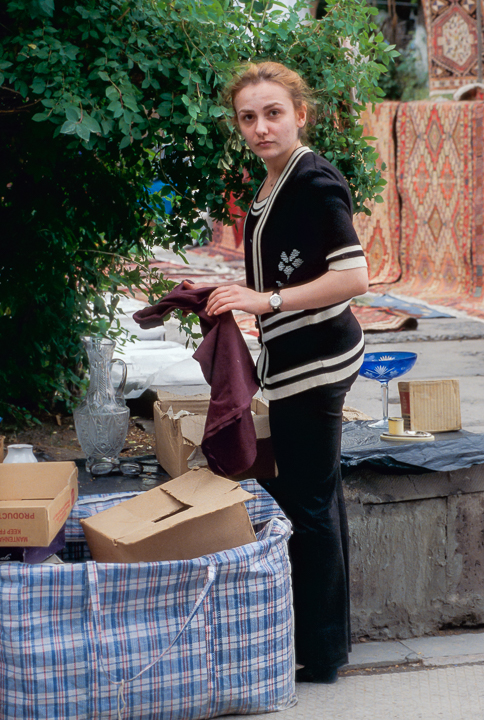
Մախմուր աղջիկ,[1]
(Continues)
(Continues)
Contributed by Riccardo Gullotta 2023/9/30 - 22:42
Song Itineraries:
Exiles and exilees, The Armenian Genocide
Warszawianka 1905 roku [Варшавянка; La Varsovienne; ¡A las barricadas!]
![Warszawianka 1905 roku [Варшавянка; La Varsovienne; ¡A las barricadas!]](img/upl/hakobbooklet.png)
1ג. Վարշավեանկա: La versione armena di Hakob Hakobyan [1902]
1ג. Վարշավեանկա: Hakob Hakobyan's Armenian version [1902]
After a long journey I was finally able to reveal the entire Armenian version of Варшавянка (Վարշավեանկա). This Armenian chant is now revived here after 100 years. The Armenian lyrics were written in 1902 by Hakob Hakobyan (Հակոբ Հակոբյան), the father of the Armenian proletarian literature. He wrote a number of anti-Tsarist lyrics at the same time, including revolutionary songs such as "La Marseillaise" and "L'Internationale".
Hakob Hakobyan was born in Gandzak in 1866, in the family of a craftsman. He studied for a year in the village with a woman named Tsovi Aghi and then entered a parish school. Hakobyan's father wanted to make the boy a priest or a craftsman, but his mother managed to send his son to a gymnasium. Since the Armenian language and literature were forbidden... (Continues)
1ג. Վարշավեանկա: Hakob Hakobyan's Armenian version [1902]
After a long journey I was finally able to reveal the entire Armenian version of Варшавянка (Վարշավեանկա). This Armenian chant is now revived here after 100 years. The Armenian lyrics were written in 1902 by Hakob Hakobyan (Հակոբ Հակոբյան), the father of the Armenian proletarian literature. He wrote a number of anti-Tsarist lyrics at the same time, including revolutionary songs such as "La Marseillaise" and "L'Internationale".
Hakob Hakobyan was born in Gandzak in 1866, in the family of a craftsman. He studied for a year in the village with a woman named Tsovi Aghi and then entered a parish school. Hakobyan's father wanted to make the boy a priest or a craftsman, but his mother managed to send his son to a gymnasium. Since the Armenian language and literature were forbidden... (Continues)
Վարշավեանկա
(Continues)
(Continues)
Contributed by Boreč 2023/6/2 - 12:37
Το μινόρε της αυγής

Vazgen Ghazaryan
ՄԻՆՈՐՆ ԱՅԳԱԲԱՑԻ (Continues)
Contributed by Riccardo Gullotta 2022/12/23 - 21:40
Բինգյօլ
Bingyol
[1941]
բանաստեղծություն / Poesia / A Poem by / Poème / Runo / Şiir:
Avetik Sahak Isahakyan [Ավետիք Սահակի Իսահակյան]
Երաժշտություն / Musica / Music / Musique / Sävel / Müzik :
Anonimo
Կատարող / Interprete / Performed by / Interprétée par / Laulavat / Tarafından gerçekleştirilen :
1. Element Band
Album: Oo
2. Haig Yazdjian
Album: Garin
3. Lusik Koshyan [Լուսիկ Քոշյան ]
4. Sarine Sagherian [Սարինա Քրոս]
5.Sona Rubenyan [Սոնա Ռուբենյան]]
6. Seven Eight Band
La canzone è la trasposizione in musica di una poesia struggente dell’armeno Avetik Sahak Isahakyan [Ավետիք Սահակ Իսահակյան]. Questa, come tante altre sue composizioni, ha come tema centrale il genocidio armeno. La popolazione di Bingöl fu deportata nel 1915 anche a marce forzate verso zone desertiche, gran parte morirono di stenti.
Isahakyan visse in pieno la persecuzione turca culminata nella tragedia del genocidio.... (Continues)
[1941]
բանաստեղծություն / Poesia / A Poem by / Poème / Runo / Şiir:
Avetik Sahak Isahakyan [Ավետիք Սահակի Իսահակյան]
Երաժշտություն / Musica / Music / Musique / Sävel / Müzik :
Anonimo
Կատարող / Interprete / Performed by / Interprétée par / Laulavat / Tarafından gerçekleştirilen :
1. Element Band
Album: Oo
2. Haig Yazdjian
Album: Garin
3. Lusik Koshyan [Լուսիկ Քոշյան ]
4. Sarine Sagherian [Սարինա Քրոս]
5.Sona Rubenyan [Սոնա Ռուբենյան]]
6. Seven Eight Band
La canzone è la trasposizione in musica di una poesia struggente dell’armeno Avetik Sahak Isahakyan [Ավետիք Սահակ Իսահակյան]. Questa, come tante altre sue composizioni, ha come tema centrale il genocidio armeno. La popolazione di Bingöl fu deportata nel 1915 anche a marce forzate verso zone desertiche, gran parte morirono di stenti.
Isahakyan visse in pieno la persecuzione turca culminata nella tragedia del genocidio.... (Continues)
Երբ բաց եղան գարնան կանաչ դռները, [1]
(Continues)
(Continues)
Contributed by Riccardo Gullotta 2022/10/20 - 09:52
Song Itineraries:
The Armenian Genocide
Гимн демократической молодёжи мира
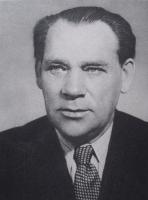
Աշխարհի դեմոկրատական երիտասարդության հիմնը
(Continues)
(Continues)
Contributed by Boreč 2021/9/22 - 02:17
Yes kou aperet
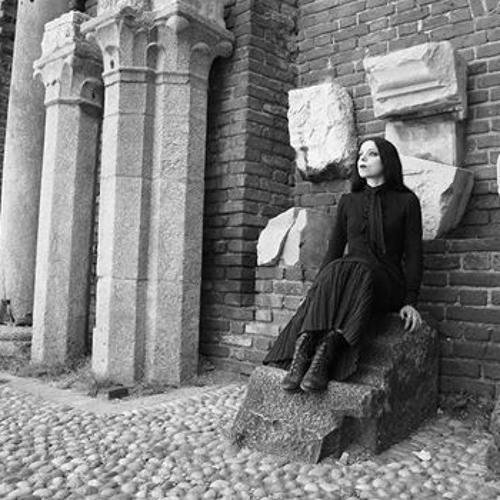
Եքու ափերէդ...
Yekʿu apʿered...
2015
Manifesto Anti-War EP
Original Armenian poem by Avedis Tekeyan (Extracted from his book Behesnihayut'yan koġkotan 1914-1918 – The Tragedy of Armenians of Behesni 1914-1918, published in Beirut 1956)
“Yekʿu apʿered...” è un testo poetico scritto dal nonno paterno di Rita, Avedis Tekeyan, anch’egli artista, che qui è stato messo in musica: la raffinata base formata dal piano e dal synth, le voci sommesse in lontananza, il canto accorato e partecipe, tutto questo concorre a disegnare lo scenario di un dolore senza speranza.
Yekʿu apʿered...
2015
Manifesto Anti-War EP
Original Armenian poem by Avedis Tekeyan (Extracted from his book Behesnihayut'yan koġkotan 1914-1918 – The Tragedy of Armenians of Behesni 1914-1918, published in Beirut 1956)
“Yekʿu apʿered...” è un testo poetico scritto dal nonno paterno di Rita, Avedis Tekeyan, anch’egli artista, che qui è stato messo in musica: la raffinata base formata dal piano e dal synth, le voci sommesse in lontananza, il canto accorato e partecipe, tutto questo concorre a disegnare lo scenario di un dolore senza speranza.
Ես քու ափերէդ բռնի հեռացած, [1]
(Continues)
(Continues)
Contributed by dq82 2021/9/16 - 21:58
Song Itineraries:
The Armenian Genocide
Гимн Международного Союза Студентов

The text of Hymn IUS in armenian was originally published in the soviet pioniri songbook of the Armenian SSR
Ուսանողների միջազգային միության հիմն
(Continues)
(Continues)
Contributed by Boreč 2021/9/4 - 05:41
Warszawianka 1905 roku [Варшавянка; La Varsovienne; ¡A las barricadas!]
![Warszawianka 1905 roku [Варшавянка; La Varsovienne; ¡A las barricadas!]](img/links/t_612329fe_d2df3a4.jpeg)
2γ. Վարշավյանկա [Varšavyank'a] - Un'immagine della versione armena
2γ. Վարշավյանկա [Varšavyank'a] - An image of the Armenian version
" Ho trovato i testi della versione armena della "Varšavjanka", ma la stampa è così vecchia che non riesco a leggerli affatto...
Ma...Sono sorpreso che questa canzone si sia diffusa in Asia centrale, è molto rara. "[Borec]
I found the written lyrics of the Armenian version of Varshavianka, but the printed text is so old that I cannot read it..But I am amazed that this song is known in Central Asia, it is very rare. " [Borec]
2γ. Վարշավյանկա [Varšavyank'a] - An image of the Armenian version
" Ho trovato i testi della versione armena della "Varšavjanka", ma la stampa è così vecchia che non riesco a leggerli affatto...
Ma...Sono sorpreso che questa canzone si sia diffusa in Asia centrale, è molto rara. "[Borec]
I found the written lyrics of the Armenian version of Varshavianka, but the printed text is so old that I cannot read it..But I am amazed that this song is known in Central Asia, it is very rare. " [Borec]
«Վարշավյանկա» /երգի տեքստ/ - Հայկական գանձարան
«Վարշավյանկա » երգի տեքստը: Հայերեն թարգմանություն: Թղթի կտոր, մեքենագիր, խունացած, դեղնած: 13 տող: «Բուքն ու դաժան … բանվոր գա առաջ»:
[See image]
Contributed by Boreč 2021/8/23 - 06:54
Պիտ պաշտպանեմ
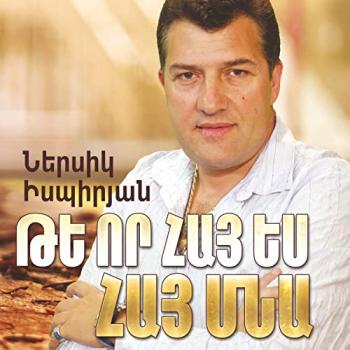
Pit Pashtpanem
2015
Hay Mna
Մանուկ հասակից լսում եմ պապերիս ձայնը*
(Continues)
(Continues)
Contributed by Dq82 2021/5/3 - 11:43
Song Itineraries:
The Armenian Genocide
Ապրելու Ապրիլ

Aprelu April
[2015]
Performers: Inga and Anush Arshakyans
Lyrics by Avet Barseghyan
Music by Mané Hakobyan
Arranged by Martin Mirzoyan
[2015]
Performers: Inga and Anush Arshakyans
Lyrics by Avet Barseghyan
Music by Mané Hakobyan
Arranged by Martin Mirzoyan
Չեն սպիանում անցած դարի վերքերս,
(Continues)
(Continues)
Contributed by Dq82 2021/5/3 - 11:26
Song Itineraries:
The Armenian Genocide
Ախ Ինչ Լավ Են
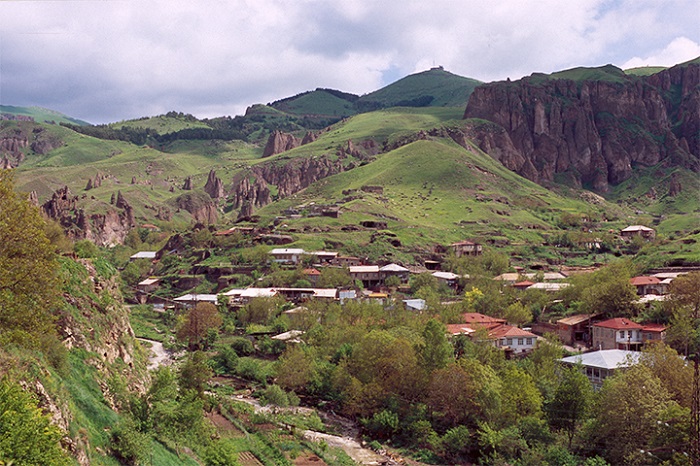
Ax Inčʻ Lav En
[1902]
Խոսքեր և Երաժշտություն / Testo e musica / Lyrics and music / Paroles et musique / Sanat ja sävel :
Hovhannes Tumanyan [Հովհաննես Թումանյան]
Կատարող / Interprete / Performed by / Interprétée par / Laulavat :
1. Hakob Babayan, Alin Demirdjian
2. Alina Manoukian
ալբոմ / Album: Na Mi Naz Ouni [2012]
3. Live
4. Live in Naregatsi Art Institute, Yerevan
1915: il genocidio degli Armeni
Dal racconto di Anny Romand, autrice di Mia nonna d’Armenia, basato sul diario della nonna Serpouhi Hovaghian
Aveva 22 anni, Serpouhi, quando una mattina accade l’irreparabile. Guardie turche bussano alla porta, intimano a tutti di uscire, saccheggiano la casa. Lei viene separata dal marito Karnik, che non rivedrà mai più, sarà massacrato insieme agli altri uomini. In braccio Aïda (appena nata), stretto a lei Jiraïr (quattro anni), Serpouhi si ritrova tra le carovane di donne in... (Continues)
[1902]
Խոսքեր և Երաժշտություն / Testo e musica / Lyrics and music / Paroles et musique / Sanat ja sävel :
Hovhannes Tumanyan [Հովհաննես Թումանյան]
Կատարող / Interprete / Performed by / Interprétée par / Laulavat :
1. Hakob Babayan, Alin Demirdjian
2. Alina Manoukian
ալբոմ / Album: Na Mi Naz Ouni [2012]
3. Live
4. Live in Naregatsi Art Institute, Yerevan
1915: il genocidio degli Armeni
Dal racconto di Anny Romand, autrice di Mia nonna d’Armenia, basato sul diario della nonna Serpouhi Hovaghian
Aveva 22 anni, Serpouhi, quando una mattina accade l’irreparabile. Guardie turche bussano alla porta, intimano a tutti di uscire, saccheggiano la casa. Lei viene separata dal marito Karnik, che non rivedrà mai più, sarà massacrato insieme agli altri uomini. In braccio Aïda (appena nata), stretto a lei Jiraïr (quattro anni), Serpouhi si ritrova tra le carovane di donne in... (Continues)
Ա՜խ, ի՜նչ լավ են սարի վըրա [1]
(Continues)
(Continues)
Contributed by Riccardo Gullotta 2021/5/2 - 22:50
Song Itineraries:
The Armenian Genocide
Կանչում եմ, արի, արի
Anonymous

Kanchoum em ari ari
[ tradizionale ]
Խոսքեր և Երաժշտություն / Testo e musica / Lyrics and music / Paroles et musique / Sanat ja sävel :
anonimo
Կատարող / Interprete / Performed by / Interprétée par / Laulavat :
Vigen Hovsepyan
È una ballata tradizionale armena, di origine Hemşin[ Համշինի ], databile tra il XVII e XVIII secolo.
Da notare nell’esecuzione di Vigen Hovsepyan l’assolo di Harutyun Chkolyan al duduk , un legno presente nella musica folk armena. Lo si può vedere nella foto seguente; tra i tre rom armeni due suonano il duduk.
[ tradizionale ]
Խոսքեր և Երաժշտություն / Testo e musica / Lyrics and music / Paroles et musique / Sanat ja sävel :
anonimo
Կատարող / Interprete / Performed by / Interprétée par / Laulavat :
Vigen Hovsepyan
È una ballata tradizionale armena, di origine Hemşin[ Համշինի ], databile tra il XVII e XVIII secolo.
Da notare nell’esecuzione di Vigen Hovsepyan l’assolo di Harutyun Chkolyan al duduk , un legno presente nella musica folk armena. Lo si può vedere nella foto seguente; tra i tre rom armeni due suonano il duduk.
Կանչում եմ արի, արի [1]
(Continues)
(Continues)
Contributed by Riccardo Gullotta 2020/10/8 - 21:48
Song Itineraries:
The Armenian Genocide
Մարտիկի Երգը
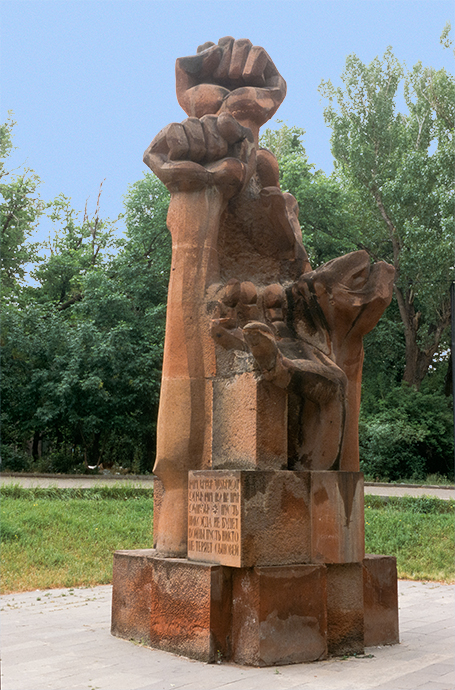
Martiki ergə
[ 1944 ]
բանաստեղծություն / Poesia / A Poem by / Poème / Runo:
Gegham Saryan [Գեղամ Սարյան]
Երաժշտություն / Musica / Music / Musique / Sävel :
Ashot Satyan [ աշոտ սաթյան ]
Կատարող / Interprete / Performed by / Interprétée par / Laulavat:
1. Arpenik Hakobyan [ Արփենիկ Հակոբյան ]
2. SHANT TV, episodio Sahmanin [ Սահմանին ] /Al confine, 2016
3. Harutyun Mkrtchyan
4. Carmen Balian
* ԹՈՂ ԵՐԲԵՔ ՊԱՏԵՐԱԶՄՆԵՐ ՉԼԻՆԵՆ, ԹՈՂ ՈՉ ՄԻ ՄԱՅՐ ՈՐԴԻ ՉԿՈՐՑՆԻ
Пусть никогда не будет войны, пусть никто мать не теряет сыновей
Mai più guerre, che nessuna madre perda un figlio
Il monumento “Mai più guerre”
Il monumento fu eretto nel Parco della Vittoria di Erevan nel 1975, in occasione del trentennale della vittoria della II guerra mondiale. Su una lapide sono incise le parole già citate in armeno e in russo. Furono 500mila gli armeni, su una popolazione di 1,5 milioni, che combatterono... (Continues)
[ 1944 ]
բանաստեղծություն / Poesia / A Poem by / Poème / Runo:
Gegham Saryan [Գեղամ Սարյան]
Երաժշտություն / Musica / Music / Musique / Sävel :
Ashot Satyan [ աշոտ սաթյան ]
Կատարող / Interprete / Performed by / Interprétée par / Laulavat:
1. Arpenik Hakobyan [ Արփենիկ Հակոբյան ]
2. SHANT TV, episodio Sahmanin [ Սահմանին ] /Al confine, 2016
3. Harutyun Mkrtchyan
4. Carmen Balian
* ԹՈՂ ԵՐԲԵՔ ՊԱՏԵՐԱԶՄՆԵՐ ՉԼԻՆԵՆ, ԹՈՂ ՈՉ ՄԻ ՄԱՅՐ ՈՐԴԻ ՉԿՈՐՑՆԻ
Пусть никогда не будет войны, пусть никто мать не теряет сыновей
Mai più guerre, che nessuna madre perda un figlio
Il monumento “Mai più guerre”
Il monumento fu eretto nel Parco della Vittoria di Erevan nel 1975, in occasione del trentennale della vittoria della II guerra mondiale. Su una lapide sono incise le parole già citate in armeno e in russo. Furono 500mila gli armeni, su una popolazione di 1,5 milioni, che combatterono... (Continues)
Թռչեի մտքով տուն, [1]
(Continues)
(Continues)
Contributed by Riccardo Gullotta 2020/10/3 - 23:15
Song Itineraries:
Fascist and Nazist mass slaughters in Italy and Europe, The Armenian Genocide
Bella Ciao
Anonymous

54. Բելա չաո / Bela ch'ao (Versione armena di Marina Manoukian)
54. Բելա չաո / Bela ch'ao (Armenian version by Marina Manoukian)
"I couldn’t find a version of ‘Bella Ciao’ in Armenian so I translated it." (Marina Manoukian)
Որ «Բելա չաոն» երգել են Դիմադրության շարժման մասնակիցները, փաստացի ապացուցված է, ինչը չի կարելի ասել նրա «գարիբալդիական» ծագման մասին։ Երգի տարածման շրջանը նեղ էր՝ բոլոնյան Ապենինների և Ռեջո-Էմիլիա շրջանի միջև, որը վերահսկվում էր պարտիզանների կողմից։ Ըստ տարածված կարծիքի երգը գրել է պարտիզաններից մեկը, որ բժիշկ կամ ֆելդշեր էր։
Երգի տեքստը վերցրած է ժողովրդական Fior di tomba («Ծաղիկը գերեզմանին») և «Թերեզայի ծաղիկը», «Ռոզինայի ծաղիկը» և «Թխկում, թխկում է դուռը» (E picchia picchia la porticella) երգերից։ Այժմ կա երգի տեքստի մի քանի տարբերակ, որոնք իրարից էապես չեն տարբերվում, օրնակ՝ «stamattina» («այսօր առավոտյան») բառի փոխարեն, մյուս տարբերակում «una mattina» («մի անգամ... (Continues)
54. Բելա չաո / Bela ch'ao (Armenian version by Marina Manoukian)
"I couldn’t find a version of ‘Bella Ciao’ in Armenian so I translated it." (Marina Manoukian)
Որ «Բելա չաոն» երգել են Դիմադրության շարժման մասնակիցները, փաստացի ապացուցված է, ինչը չի կարելի ասել նրա «գարիբալդիական» ծագման մասին։ Երգի տարածման շրջանը նեղ էր՝ բոլոնյան Ապենինների և Ռեջո-Էմիլիա շրջանի միջև, որը վերահսկվում էր պարտիզանների կողմից։ Ըստ տարածված կարծիքի երգը գրել է պարտիզաններից մեկը, որ բժիշկ կամ ֆելդշեր էր։
Երգի տեքստը վերցրած է ժողովրդական Fior di tomba («Ծաղիկը գերեզմանին») և «Թերեզայի ծաղիկը», «Ռոզինայի ծաղիկը» և «Թխկում, թխկում է դուռը» (E picchia picchia la porticella) երգերից։ Այժմ կա երգի տեքստի մի քանի տարբերակ, որոնք իրարից էապես չեն տարբերվում, օրնակ՝ «stamattina» («այսօր առավոտյան») բառի փոխարեն, մյուս տարբերակում «una mattina» («մի անգամ... (Continues)
Էս առավոտը ես վեր կացա [1]
(Continues)
(Continues)
Contributed by Riccardo Venturi 2019/9/2 - 03:18
Կակաչներ
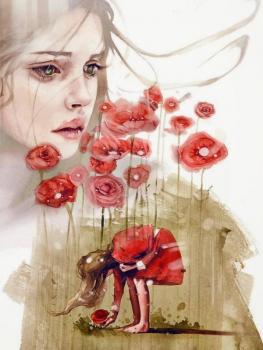
Kakač’ner
Scritto prima del 1915.
Pubblicato postumo nel 1921. Dopo essere stato ritrovato tra i beni sequestrati agli armeni.
Canto del pane (Հացին երգը)
Dalla collaborazione dell’uomo con la terra e con gli animali Dio fa nascere la vita: il grano. Non contento di ciò, Egli fa crescere in mezzo ai campi del pane di domani l’amore di oggi – il papavero scarlatto – in cui si rispecchia e si arricchisce il nostro rapportocon il pane stesso: “nelle loro coppe purpuree / berremo il mistero delle spighe”. “E dalla sua bontà abbiamo tutti ricevuto, grazia su grazia”, dice San Paolo.
Questa poesia quasi sembra una profezia del poeta circa la sua morte... Portava il canto del pane in tasca e fu ritrovato solo anni dopo tra i beni sequestrati agli armeni, grazie all'investimento di ingenti somme di denaro e l'azione di una spia. La canzone è messa in musica dal gruppo occitano (in occitano) Blu L'Azard.
Nella traduzione di Antonia Arslan, la poesia viene tradotta con Papaveri, ma potrebbe anche essere Tulipani
Scritto prima del 1915.
Pubblicato postumo nel 1921. Dopo essere stato ritrovato tra i beni sequestrati agli armeni.
Canto del pane (Հացին երգը)
Dalla collaborazione dell’uomo con la terra e con gli animali Dio fa nascere la vita: il grano. Non contento di ciò, Egli fa crescere in mezzo ai campi del pane di domani l’amore di oggi – il papavero scarlatto – in cui si rispecchia e si arricchisce il nostro rapportocon il pane stesso: “nelle loro coppe purpuree / berremo il mistero delle spighe”. “E dalla sua bontà abbiamo tutti ricevuto, grazia su grazia”, dice San Paolo.
Questa poesia quasi sembra una profezia del poeta circa la sua morte... Portava il canto del pane in tasca e fu ritrovato solo anni dopo tra i beni sequestrati agli armeni, grazie all'investimento di ingenti somme di denaro e l'azione di una spia. La canzone è messa in musica dal gruppo occitano (in occitano) Blu L'Azard.
Nella traduzione di Antonia Arslan, la poesia viene tradotta con Papaveri, ma potrebbe anche essere Tulipani
Քո՛ւյր իմ, ցանքին մեջ կակաչներ կան, քաղե՛.[1]
(Continues)
(Continues)
Contributed by Dq82 + Adriana 2018/2/4 - 12:20
Song Itineraries:
Poppie: an Antiwar flower?, The Armenian Genocide
Ցորյանի ծովեր
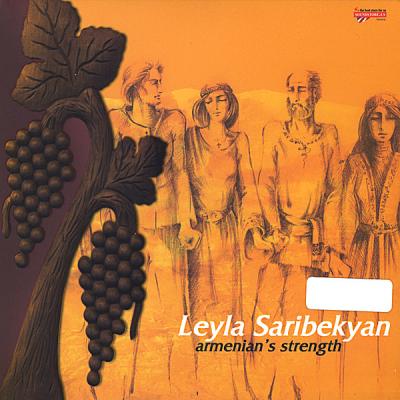
C'voryan cover
Scritto prima del 1915.
Pubblicato postumo nel 1921. Dopo essere stato ritrovato tra i beni sequestrati agli armeni.
Canto del pane (Հացին երգը)
Questa poesia è quasi un testamento. I mari di grano che Varujan descrive qui crescevano, in fatti, in una nazione che egli sa prossima al martiri – ricordiamo che aveva Il Canto del Pane in tasca quando fu deportato e ucciso - una nazione quindi più simile al “capretto” soffocato dal grano, che al grano stesso che cresceva libero. Eppure benedice il grano, e nella sua benedizione dà il suo consenso al martirio. Come il capretto nella poesia, e come quello morto al posto di Isacco, egli muore in nome del Pane del domani.
2008
Armenian's Strength
Leyla Saribekyan (Լեյլա Սարիբեկյան)
Scritto prima del 1915.
Pubblicato postumo nel 1921. Dopo essere stato ritrovato tra i beni sequestrati agli armeni.
Canto del pane (Հացին երգը)
Questa poesia è quasi un testamento. I mari di grano che Varujan descrive qui crescevano, in fatti, in una nazione che egli sa prossima al martiri – ricordiamo che aveva Il Canto del Pane in tasca quando fu deportato e ucciso - una nazione quindi più simile al “capretto” soffocato dal grano, che al grano stesso che cresceva libero. Eppure benedice il grano, e nella sua benedizione dà il suo consenso al martirio. Come il capretto nella poesia, e come quello morto al posto di Isacco, egli muore in nome del Pane del domani.
2008
Armenian's Strength
Leyla Saribekyan (Լեյլա Սարիբեկյան)
Հովե՜ր կ'ացնին. [1]
(Continues)
(Continues)
Contributed by Dq82 + Adriana 2018/2/4 - 12:03
Song Itineraries:
The Armenian Genocide
Անտունի
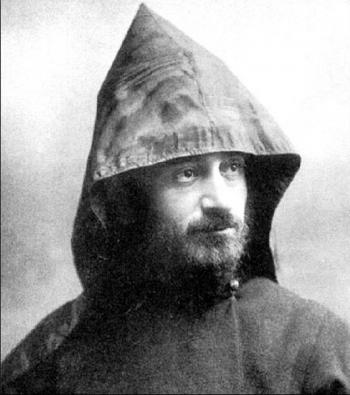
1915
Andouni (Homeless)
Testo trovato qui
Armenian priest and folksong collector, Komitas Vardapet (1869-1935), wrote down the words and tunes of Armenian folksongs and those of a few other ethnic groups as well. He wrote new choral arrangements for some of them for more formal singing. He also wrote original compositions based on the traditional music that he studied. He was imprisoned during WWI and, although he was released, he never fully recovered from what he had suffered. Some of the songs he wrote or arranged have become symbolically tied to that period. “Andouni,” a song of longing for the homeland that predates WWI, is a folksong that Komitas arranged for voice. This version, sung by Ruben J. Baboyan, may be Komitas’s arrangement of the original tune. Today the song is sung to a different tune, usually in an operatic style, as it has become emblematic of the Armenian diaspora and loss of life during WWI.
blogs.loc.gov
Andouni (Homeless)
Testo trovato qui
Armenian priest and folksong collector, Komitas Vardapet (1869-1935), wrote down the words and tunes of Armenian folksongs and those of a few other ethnic groups as well. He wrote new choral arrangements for some of them for more formal singing. He also wrote original compositions based on the traditional music that he studied. He was imprisoned during WWI and, although he was released, he never fully recovered from what he had suffered. Some of the songs he wrote or arranged have become symbolically tied to that period. “Andouni,” a song of longing for the homeland that predates WWI, is a folksong that Komitas arranged for voice. This version, sung by Ruben J. Baboyan, may be Komitas’s arrangement of the original tune. Today the song is sung to a different tune, usually in an operatic style, as it has become emblematic of the Armenian diaspora and loss of life during WWI.
blogs.loc.gov
Սիրտս նըման է էն փլած տըներ, [1]
(Continues)
(Continues)
Contributed by Dq82 2017/9/7 - 17:07
Song Itineraries:
The Armenian Genocide
Братские могилы

Armenian version by Hovhannes Saroyani (2007), from this page
Հովհաննես Սարոյանի. Թարգմանություն, 2007
Հովհաննես Սարոյանի. Թարգմանություն, 2007
La traduzione è accompagnata da una trascrizione in caratteri latini.
The translation is provided with a transcription into Latin characters.
The translation is provided with a transcription into Latin characters.
ԵՂԲԱՅՐԱԿԱՆ ԳԵՐԵԶՄԱՆՆԵՐ
(Continues)
(Continues)
Contributed by Riccardo Venturi 2015/4/6 - 23:17
Գինի լից
Anonymous
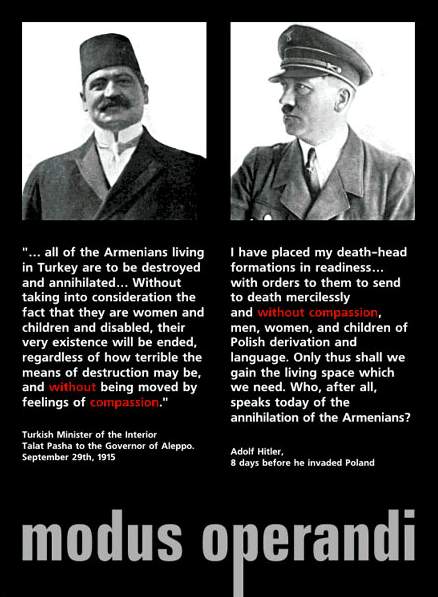
Gini lits
[1921?]
Canzone armena che celebra l’assassinio del Gran Visir dell’impero ottomano Mehmed Talât Pasha, avvenuto a Berlino il 15 marzo 1921 ad opera di Soghomon Tehlirian (Սողոմոն Թեհլերեան), militante rivoluzionario armeno, con la determinante collaborazione logistica dei servizi segreti britannici.
Mehmed Talât Pasha era stato uno degli uomini politici più influenti dell’impero ottomano durante la Prima guerra mondiale ed il mandante del genocidio armeno. Gli inglesi, alla fine della guerra, avrebbero voluto arrestarlo e processarlo per i suoi crimini, e non solo per il massacro della popolazione armena, ma poi, per motivi di opportunità diplomatica (Talât Pasha si era rifugiato a Berlino dove godeva di piena protezione), preferirono lasciarlo alla vendetta dei perseguitati. Mehmed Talât Pasha era infatti considerato dagli armeni come l’ “Hitler turco”, il n° 1 nella lista... (Continues)
[1921?]
Canzone armena che celebra l’assassinio del Gran Visir dell’impero ottomano Mehmed Talât Pasha, avvenuto a Berlino il 15 marzo 1921 ad opera di Soghomon Tehlirian (Սողոմոն Թեհլերեան), militante rivoluzionario armeno, con la determinante collaborazione logistica dei servizi segreti britannici.
Mehmed Talât Pasha era stato uno degli uomini politici più influenti dell’impero ottomano durante la Prima guerra mondiale ed il mandante del genocidio armeno. Gli inglesi, alla fine della guerra, avrebbero voluto arrestarlo e processarlo per i suoi crimini, e non solo per il massacro della popolazione armena, ma poi, per motivi di opportunità diplomatica (Talât Pasha si era rifugiato a Berlino dove godeva di piena protezione), preferirono lasciarlo alla vendetta dei perseguitati. Mehmed Talât Pasha era infatti considerato dagli armeni come l’ “Hitler turco”, il n° 1 nella lista... (Continues)
Աշխարհ սարսափ հայի ահը,
(Continues)
(Continues)
Contributed by Bernart Bartleby 2015/1/19 - 13:39
Song Itineraries:
The Armenian Genocide
Նազեի օրոր
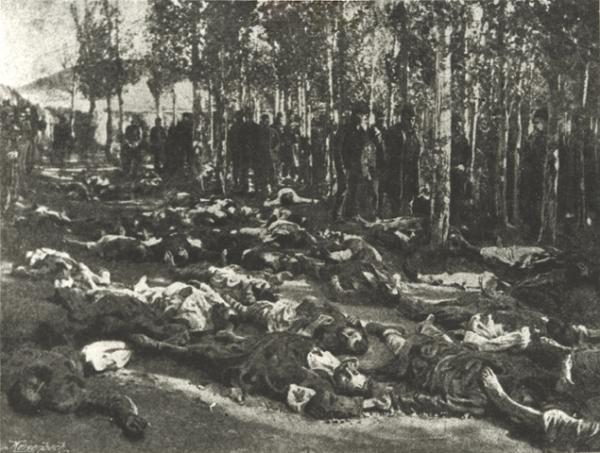
Nazei Oror
[1894-96]
Versi di Avetis Aharonian / Աւետիս Ահարոնեան (1899-1948), scrittore e poeta armeno, militante rivoluzionario e figura di spicco del Movimento di Liberazione armeno.
Una poesia in forma di ninna nanna scritta da Aharonian ai tempi del primo massacro degli armeni, quello avvenuto alla fine dell’800 per mano del sultano ottomano Abdul Hamid II. All’epoca gli armeni nell’impero ottomano erano circa 2 milioni e, sostenuti dalla Russia, avanzavano pretese autonomiste. Il governo, dal canto suo, osteggiava l’ingerenza russa ed era andato instillando ed alimentando l’odio anti-armeno in altre etnie presenti nella regione, in primis quella curda. Sicchè quando gli armeni si rivoltarono contro la feroce imposizione fiscale ottomana e le angherie dei curdi la reazione fu feroce: centinaia di migliaia di morti.
E non fu che l’inizio. I “Giovani Turchi” furono responsabili di... (Continues)
[1894-96]
Versi di Avetis Aharonian / Աւետիս Ահարոնեան (1899-1948), scrittore e poeta armeno, militante rivoluzionario e figura di spicco del Movimento di Liberazione armeno.
Una poesia in forma di ninna nanna scritta da Aharonian ai tempi del primo massacro degli armeni, quello avvenuto alla fine dell’800 per mano del sultano ottomano Abdul Hamid II. All’epoca gli armeni nell’impero ottomano erano circa 2 milioni e, sostenuti dalla Russia, avanzavano pretese autonomiste. Il governo, dal canto suo, osteggiava l’ingerenza russa ed era andato instillando ed alimentando l’odio anti-armeno in altre etnie presenti nella regione, in primis quella curda. Sicchè quando gli armeni si rivoltarono contro la feroce imposizione fiscale ottomana e le angherie dei curdi la reazione fu feroce: centinaia di migliaia di morti.
E non fu che l’inizio. I “Giovani Turchi” furono responsabili di... (Continues)
Քնի'ր, իմ բալիկ, օրոր իշ արա,
(Continues)
(Continues)
Contributed by Bernart Bartleby 2015/1/19 - 11:58
Song Itineraries:
The Armenian Genocide
Todesfuge

ARMENO / ARMENIAN / ARMÉNIEN / ARMENIA
Versione armena
Armenian version
Version arménienne
Armeniankielinen versio
Versione armena
Armenian version
Version arménienne
Armeniankielinen versio
Direttamente riportata sulla voce "Paul Celan" (Պաուլ Ցելան) di hy:wikipedia.
ՄԱՀՎԱՆ ՖՈՒԳԱ
(Continues)
(Continues)
Contributed by Riccardo Venturi 2011/10/31 - 21:47
The Dance [Պարը] - Ter Vogormia [Տէր Ողորմյա]
![The Dance [Պարը] - Ter Vogormia [Տէր Ողորմյա]](img/upl/defNYC2.gif)
Poesia di Ատոմ Եարճանեան [Atom Yarjanian], detto Սիամանթօ [Siamanto], 1909
Musica di Diamanda Galás
Recitazione: Shakeh Kadehijan
Melodia liturgica: Տէր Ողորմյա (Ter Vogormia, Der Voghormia, Der Voghormea), eseguita da Marar Yekmalian
A poem by Ատոմ Եարճանեան [Atom Yarjanian], known as Սիամանթօ [Siamanto], 1909
Music by Diamanda Galás
Recited text: Shakeh Kadehijan
Liturgic melody: Տէր Ողորմյա (Ter Vogormia, Der Voghormia, Der Voghormea), performed by Marar Yekmalian
Album: Defixiones Will and Testament
Defixiones refers to the warnings engraved in lead which were placed on the graves of the dead in Greece and Asia Minor. They cautioned against moving or desecrating the corpses under threat of extreme harm.
Will and Testament refers to the last wishes of the dead who have been taken to their graves under unnatural circumstances.
The concert material that Galás has included... (Continues)
Musica di Diamanda Galás
Recitazione: Shakeh Kadehijan
Melodia liturgica: Տէր Ողորմյա (Ter Vogormia, Der Voghormia, Der Voghormea), eseguita da Marar Yekmalian
A poem by Ատոմ Եարճանեան [Atom Yarjanian], known as Սիամանթօ [Siamanto], 1909
Music by Diamanda Galás
Recited text: Shakeh Kadehijan
Liturgic melody: Տէր Ողորմյա (Ter Vogormia, Der Voghormia, Der Voghormea), performed by Marar Yekmalian
Album: Defixiones Will and Testament
Defixiones refers to the warnings engraved in lead which were placed on the graves of the dead in Greece and Asia Minor. They cautioned against moving or desecrating the corpses under threat of extreme harm.
Will and Testament refers to the last wishes of the dead who have been taken to their graves under unnatural circumstances.
The concert material that Galás has included... (Continues)
Եվ արցունքնենրն իրեն կապույտ աչքերուն մեջ խեղդելով,
(Continues)
(Continues)
Contributed by DonQuijote82 + CCG/AWS Staff 2011/10/15 - 16:34
Song Itineraries:
Exiles and exilees, The Armenian Genocide
×
![]()




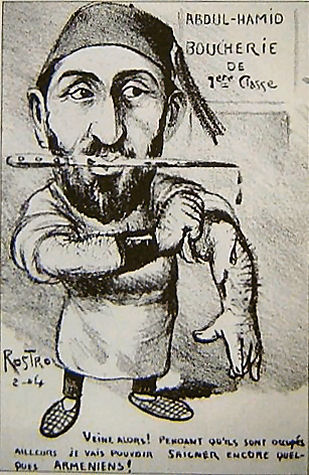
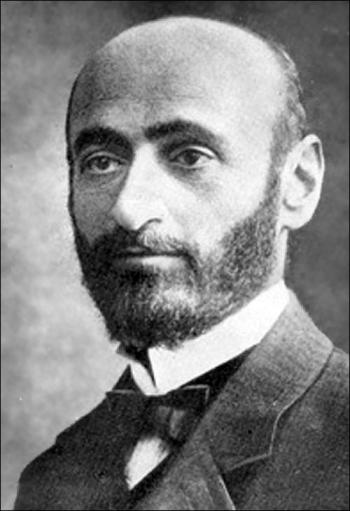

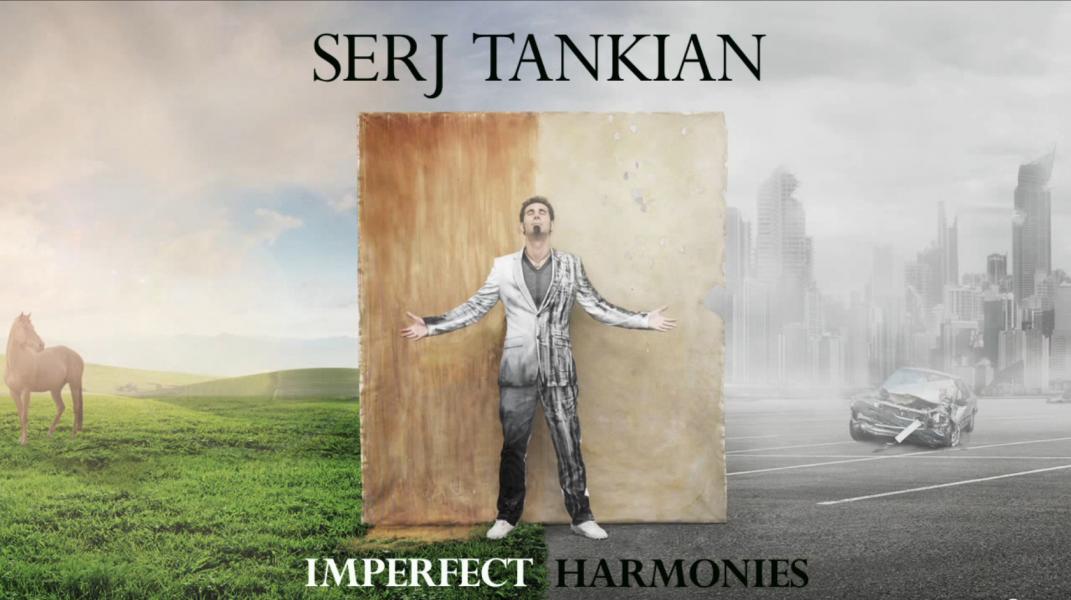
[1960]
բանաստեղծություն / Poesia / A Poem by / Poème / Runo:
Silva Kaputikian [Սիլվա Կապուտիկյան]
Երաժշտություն / Musica / Music / Musique / Sävel :
Khachatur Avetisyan [Խաչատուր Ավետիսյան]
Կատարող / Interprete / Performed by / Interprétée par / Laulavat:
1.Arpi Alto [Արփի Ալտո]
2. Varduhi Khachatryan[ Վարդուհի Խաչատրյան]
3. Ani Kharatyan [Անի Խառատյան]
I versi che seguono sono della poetessa armena contemporanea Tatev Chakhian . La traduzione in inglese è di Lucille Janinyan.
italiano
english
լեզու
RETROSPETTIVA
Un tempo vivevamo lentamente
in tempo di pace.
Ciò che era perduto alla fine fu ritrovato
la vita era un posto sicuro in cui vivere,
e anche svanire volontariamente.
Dio veniva ricordato nelle occasioni importanti,
nella sfortuna, lo invocavamo
per tenerci presenti... e Dio lo ha fatto!
La nostra vita -
un'ora guadagnata in un tempo... (Continues)